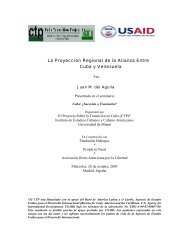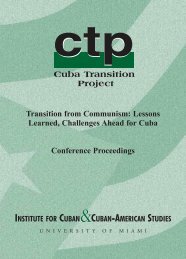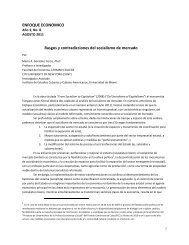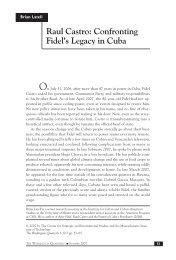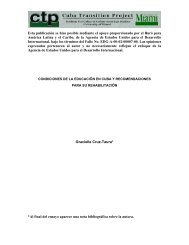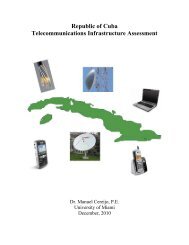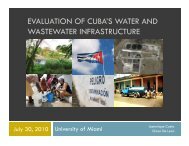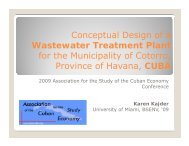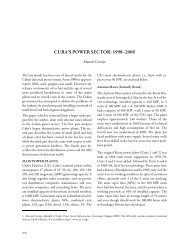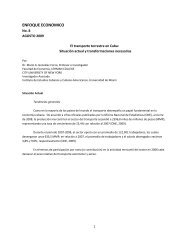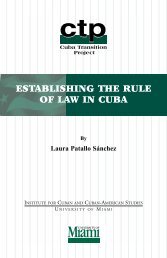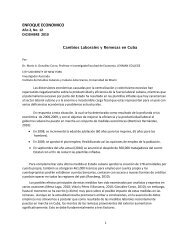Emilio González - Cuba Transition Project - University of Miami
Emilio González - Cuba Transition Project - University of Miami
Emilio González - Cuba Transition Project - University of Miami
Create successful ePaper yourself
Turn your PDF publications into a flip-book with our unique Google optimized e-Paper software.
I wish to thank the organizers <strong>of</strong> this conference, the <strong>University</strong> <strong>of</strong> <strong>Miami</strong>, theUniversidad de Belgrano and the Konrad Adenauer Foundation, for organizing such atimely and important gathering such as this. The subject <strong>of</strong> <strong>Cuba</strong> is one that inflamespassions on all sides <strong>of</strong> the political spectrum. Honorable people can disagree ondifferent aspects <strong>of</strong> <strong>Cuba</strong>’s role in the international political arena as well as <strong>Cuba</strong>’sdomestic political model, but only the most partisan <strong>of</strong> these can negate the totalitariannature <strong>of</strong> the Castro Government. In my view <strong>Cuba</strong> is not a Republic, it is not a Socialiststate, it is not a nationalist revolution and it is not an experiment in tropical Marxism. Incommercial terms, <strong>Cuba</strong> is a wholly-owned subsidiary <strong>of</strong> a small band <strong>of</strong> aging antidemocraticrevolutionaries that manage the affairs <strong>of</strong> state much like GeneralissimoTrujillo <strong>of</strong> the Dominican Republic or General Somoza <strong>of</strong> Nicaragua. There are no clearlines that distinguish when the Castro cabal stops and when government institutionsbegin.In a hemispheric context, Fidel Castro’s <strong>Cuba</strong> is a stain on the wave <strong>of</strong> democraticgovernments now flourishing, an insult to all <strong>of</strong> our collective consciences. It is withinthis context that the United States has established a decades-long policy <strong>of</strong> supportdemocracy while isolating <strong>Cuba</strong>’s anti-democratic leaders thus denying them theresources with which to foment political instability around the world.For over four decades, the policy <strong>of</strong> the government <strong>of</strong> the United States <strong>of</strong>America (U.S.) towards <strong>Cuba</strong> has been dominated by a bipartisan consistency both in theexecutive and legislative braches <strong>of</strong> the U.S. government. Since the enactment <strong>of</strong> the U.S.trade embargo and other sanctions toward <strong>Cuba</strong> in the early 1960’s to the results <strong>of</strong>Commission for Assistance to a Free <strong>Cuba</strong> implemented by the George W. Bushadministration in 2004, all policies towards the country’s communist regime have beensupported by both Democratic and Republican administrations.One <strong>of</strong> the most important aspects <strong>of</strong> the policy <strong>of</strong> the U.S. government vis-à-vis<strong>Cuba</strong> is to promote a peaceful transition to a democratic regime that respects individualrights and the democratic process. The <strong>Cuba</strong>n Democracy Act <strong>of</strong> 1992 (CDA), forexample, states that it should be the policy <strong>of</strong> the United States to seek a peacefultransition to democracy and a resumption <strong>of</strong> economic growth in <strong>Cuba</strong> through the1




